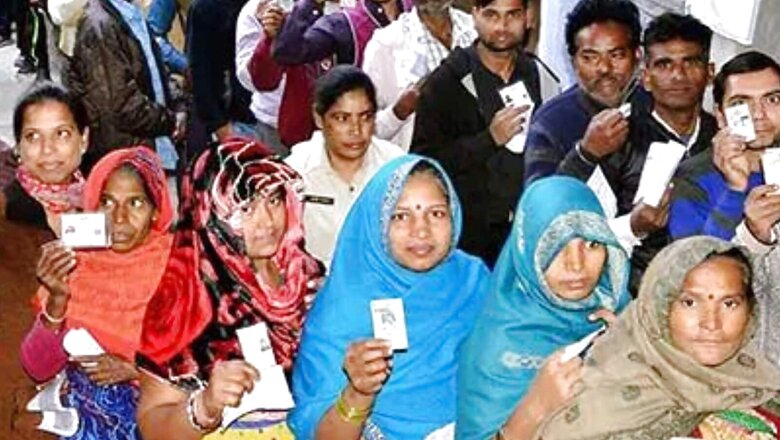
views
While caste census has become a hot potato in mainstream media, villagers in eastern Uttar Pradesh said they had no idea what it was. “Hum logo ko iss se koi matlab nahi,” is the common response we got from villagers during a recent field study. A few young political workers of the Opposition parties, however, were aware of the debates around caste census.
The demand for caste census raised by leaders of certain political parties has managed to reach their cadre, but can it reach the rural voters of Uttar Pradesh?
The parties demanding caste census are catering to the politics of social justice that focuses on ‘power in numbers’ in a democracy. But the entire social justice project is based on the ethical aspect in a democracy. When there is an overemphasis on numbers and majority in distribution of social justice-based opportunities and resources, the ethical ground is lost. What remains is an aggressive claim. This shows the crisis in social justice politics in India.
This crisis has been caused by two factors. First, because the social justice project to a large extent has failed to deliver. Second, because of the rise of Hindutva politics that emerged as a competitor in mobilizing backward and Dalit communities and bringing them into its fold.
ALSO READ | UP Next: Muslims Not a Homogeneous Bloc and Why a Section of Them Will Vote for BJP
Disillusionment with Social Justice Politics
As a concept, social justice politics is believed to represent the interests of all backwards and marginals in a democracy. But in the last few decades, it has largely helped certain dominant groups with numerical strength. This trend is against the very nature of social justice.
Those claiming to fight for social justice must deliver on two fronts: first, fight for the development of the caste they belong to, and second, to ensure equal distribution of democratic resources among most marginal and invisible backward and Dalit communities.
But today, social justice politics is ridden with structural inequalities and multiple marginalities deeply embedded in it. Although a product of traditional power structure, these inequalities were never quite addressed by modern social justice project.
Communities with larger numbers are more valuable in democratic politics. The big numbers work in two ways—on one hand it helps in countering traditional social dominance, on the other hand, it also gives rise to newer forms of socio-political dominance. In a democracy, numerical strength can give a community the power to assert itself, and also to oppress other smaller communities. And here in lies the dangers of majoritarianism.
The politics of Babasaheb Ambedkar, Ram Manohar Lohia, the Congress and parties active in South India shaped the social justice movement in the years immediately after Independence. Then came the Mandal Commission, which gave hope to backwards and marginals. Their aspirations gave power to youth leaders like Lalu Prasad Yadav, Nitish Kumar, Mulayam Singh, Mayawati, who emerged as custodians of social justice politics.
But while these leaders acquired power, they failed in providing adequate political representation to marginal communities other than the ones they belong to. As a result, a sense of being left out developed in several backward and smaller Dalit communities. The disillusionment with social justice politics among a section of marginalized created the space for the Hindutva project of social empowerment.
ALSO READ | UP Next: In BSP, Jatavs Saw an Opportunity to Acquire Power. Mayawati Knows She Has to Deliver in 2022
Space for Hindutva Politics
It is interesting to compare that while social justice politics depends heavily on the state for opportunities, dignity and social respect, Hindutva politics combines state and state-led projects, organization-driven social schemes and religious pride to give a sense of empowerment to the marginalized. Social justice politics in India is centred around taking pride in your caste identity; Hindutva politics appeals to the Hindutva identity of a person, which subsumes the caste identity.
When a section of backward and marginal communities experience economic mobility and political representation, they aspire for respect, not just from their community members but also from traditionally dominant communities, including upper castes. The Hindu ritualistic space—puja-path, teerth yatras, religious programmes—provides the backward communities the platform for social-cultural mobility as well. We can have ‘intellectual’ debates over such forms of social inclusion, but for a large section in India, especially rural India, it matters.
While social justice-based politics focuses on secular democratic desires of the marginalized, Hindutva politics works on both economic and religious-cultural aspirations.
This politics of Hindutva is finding resonance among several backward and marginalized communities in northern India, especially Uttar Pradesh, who felt left out of the social justice movement. Many non-Yadav OBC and MBC castes, most-marginal Dalits and semi-nomadic communities, have emerged as the supporters of Hindutva in the last few years.
The Samajwadi Party, the Bahujan Samaj Party and even the Congress in Uttar Pradesh want to reinvent themselves and their politics of social justice by raising the need for caste census, and trying to counter the BJP-led project of Samajik Samrasta (social synthesis). But based on my field observations, OBC caste census is not an issue in rural UP, yet. To make it an electoral issue that influences voting choices is difficult, to state the obvious.
Let’s see how Opposition parties in Uttar Pradesh project the caste census as an issue in the forthcoming elections. Interesting times ahead!
Badri Narayan is professor and director of GB Pant Social Science Institute, Prayagraj, and the author of ‘Republic of Hindutva’. The views expressed in this article are those of the author and do not represent the stand of this publication.
Read all the Latest News , Breaking News and IPL 2022 Live Updates here.














Comments
0 comment